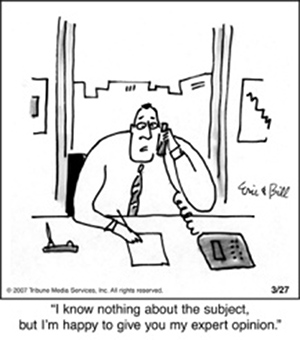How is it that the boldest criminals so often turn out to be the most clueless? James Blankenship was, it would seem, pretty sure of himself when he broke into a home outside Cleveland in broad daylight last summer. “I thought you could only be charged with burglary if you break in during the nighttime,” he reportedly told the police officers who arrested him.
Before laughing too hard, you should know there’s a bit of James Blankenship in all of us. That’s because we’re all susceptible to something called the Dunning-Kruger Effect when we venture outside our areas of expertise.
“When people are incompetent,” wrote the Cornell University psychologists David Dunning and Justin Kruger in a seminal 1999 paper, “not only do they reach erroneous conclusions and make unfortunate choices, but their incompetence robs them of the ability to realize it.” We are often most confident, in other words, when we are most ignorant.

Here’s what Dunning and Kruger found out in a series of lab tests: If you’re a bad judge of what other people will find funny, you’re more likely to think of yourself as a great comedian; if you perform poorly on tests of basic grammar, you’re more likely to overrate your facility with language. Why? “The skills that engender competence in a particular domain are often the very same skills necessary to evaluate competence in that domain,” the psychologists surmised. And there’s a flip side to Dunning-Kruger as well: People who are genuinely competent tend to sell themselves short, underrating their abilities.
“The best lack all conviction,” wrote the poet W. B. Yeats, “while the worst are full of passionate intensity.” Turns out he wasn’t just describing Europe after World War I. He was describing any given Wednesday. But take heart: With a little negative feedback, people do learn to calibrate their self-assessments. And for most of us—bumbling burglars excepted—that feedback won’t come in the form of several days in the slammer.
This post originally appeared in the January/February 2014 issueofPacific Standard as “Want to Get Rich? Get Fit!” For more, consider subscribing to our bimonthly print magazine.




